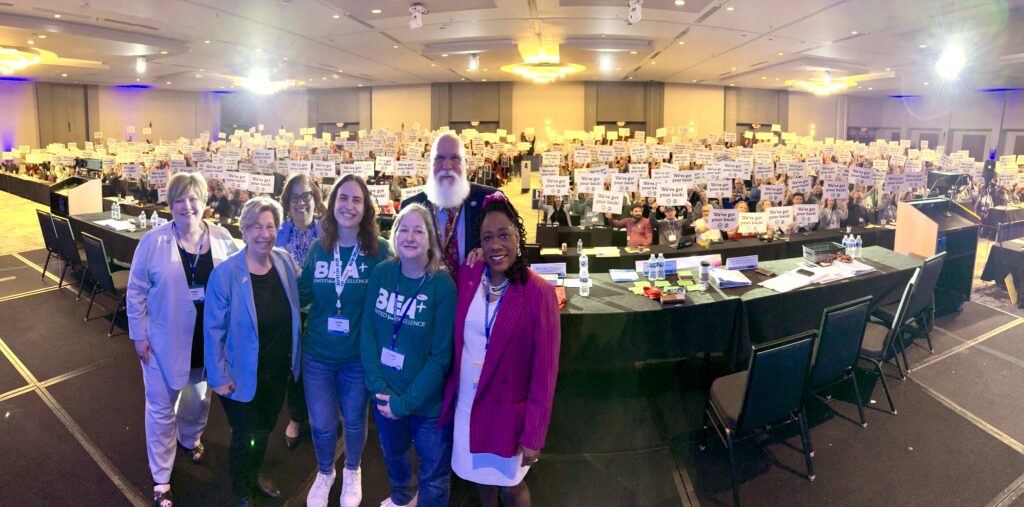
During a break in discussion of business items, over 600 delegates to the Education Minnesota Representative Convention posed for a photo with signs that all said the same thing: “BEA, we’ve got your back!”
The signs were a demonstration of support for the Becker Education Association, which was going through a challenge to its exclusive representation status for the district.
The photo, which included NEA President Becky Pringle, AFT President Randi Weingarten, Education Minnesota officers Denise Specht, Monica Byron and Rodney Rowe, and BEA co-presidents Lauren Pauley and Karen Landsverk, encapsulates the solidarity that comes from belonging to a national, state and local union.
Landsverk and Pauley say that solidarity was a big part of why BEA successfully retained its exclusive representation status. Back home in Becker, different visions were emerging of what the union should be and where its focus should lie. A few years ago, a small group of BEA members did not agree with the direction that the state and national unions were moving. They felt it was too political and wanted the union to focus solely on local issues.
BEA leaders disagreed, arguing that state and federal policies have too much impact on classrooms for educators to avoid them. Curriculum standards and funding are set at both the state level and national level, and choosing to stop participating in those discussions would result in a loss of collective power, thus creating a less effective union.
That group of members eventually broke away and formed a new organization, the Becker Association of Professional Educators. BAPE pitched itself as a local-focused alternative to BEA, for members who wanted union representation without politics.
Not long after its formation, BAPE tried to challenge BEA’s exclusive representation status. But the first time they tried, they were unable to secure enough challenge cards to trigger an election.
After the initial attempt to challenge BEA’s exclusive representation status, the local began organizing so that they were ready to respond if they were challenged again. Their strategy was simple: build relationships and share information through open communication. BEA established four to five members per building to be “champions,” individuals who are widely respected and trusted by members to give accurate and clear information. The champions’ role was to have conversations, answer questions and receive feedback from members about the union’s priorities.
Pauley said that information sharing was a way to show solidarity with members. “This is what the union is,” she said. “We care about what everyone is thinking and what everyone’s vision of the future is.”
To set their champions up for success, another member began creating communications materials, such as Q&A documents, and establishing avenues to get information out to members first. “Inevitably, the other side will have messages too. What we found is that oftentimes, their messaging wasn’t inaccurate, but it was often incomplete,” Landsverk said. BEA leaders felt it was important to have people available to answer questions and clarify information for members.
BEA kept all of its communications positive. They framed the issue in a positive light, focusing on how much more effective the union is when part of the state and national affiliates, and how much more support they can provide to each other when they work as part of a larger collective.
They also emphasized how the size of the state and national affiliates allows them to provide services that most locals don’t have the capacity to do on their own. For example, Education Minnesota has a dedicated team of lawyers that can provide contract support and legal advice. “When we don’t understand something, it’s the bigger collective that makes the difference,” Landsverk said.
She points to the recent pension improvements Education Minnesota advocated for at the Capitol as an example of how the collective power of the state affiliate was able to win big for educators: Because tens of thousands of educators were advocating on this bill, the bill eventually had 17 sponsors and received bipartisan support. The backing of tens of thousands of voices is what makes those large-scale victories possible.
Solidarity from nearby locals helped bolster the movement. St. Cloud Education Association sent Crumbl cookies to BEA members. SCEA and other locals nearby took photos holding signs of support for BEA that were compiled into a slideshow and shown to members at a general meeting. At the Representative Convention, hundreds of members from across the state stood in support of BEA.
After establishing their communications strategy and trusted messengers, BEA found ways for passionate members to get involved. In addition to the champions, they had a group of people—affectionately referred to as the Fab Five—focused on the behind-the-scenes and logistical details: grabbing doughnuts for meetings, ensuring sign-in sheets were ready to go, providing pizza for members who attended school board meetings, scheduling lunches at schools and sending postcards with testimonials to Becker educators.
Because of these organizing efforts, when BAPE collected enough challenge cards to trigger a vote this past spring, BEA was ready.
Once the election was underway, BEA was able to shift its focus from voter persuasion to voter turnout. “We wanted high turnout for the vote because we wanted to use it to get an idea of our future as a local,” said Pauley.
To achieve the levels of turnout they wanted, BEA made it as easy as possible for members to vote. BEA sent out guidance about the ballots and a timeline so that members knew what to expect. They organized ballot drop-off events and hand-delivered sealed ballots for members who did not want to mail their ballots.
BEA’s efforts were ultimately successful: they achieved 90% voter turnout across the district. Of those who voted, 71% elected to keep BEA as the exclusive representative for Becker, and 29% voted for BAPE.
“I think people realized that, yes, local is important, but we are not an island. The collective is important,” said Landsverk. They said this process showed members that there are a lot of educators going through similar issues, such as struggling with negotiations or with their school boards, and that it was empowering to have more than just a small group.
Pauley and Landsverk emphasized that this victory was truly a team effort. “People are passionate about our local, about that unity and continuing something that historically has been a really important part of our community,” Pauley said. While they knew that solidarity was a strong value in Becker, both leaders said they were blown away by the support they received from the community, from other locals, and from Education Minnesota leaders and staff. “Sometimes you feel kind of alone, and this made us realize that this isn’t just our fight, this is a fight for all of us,” said Landsverk.
Pauley and Landsverk say their focus is now on rebuilding and moving forward, but they are proud of the relationships the local has built. “While we need to continue to work on bringing people in, I believe we strengthened a lot of the relationships we’ve had,” Landsverk said.

